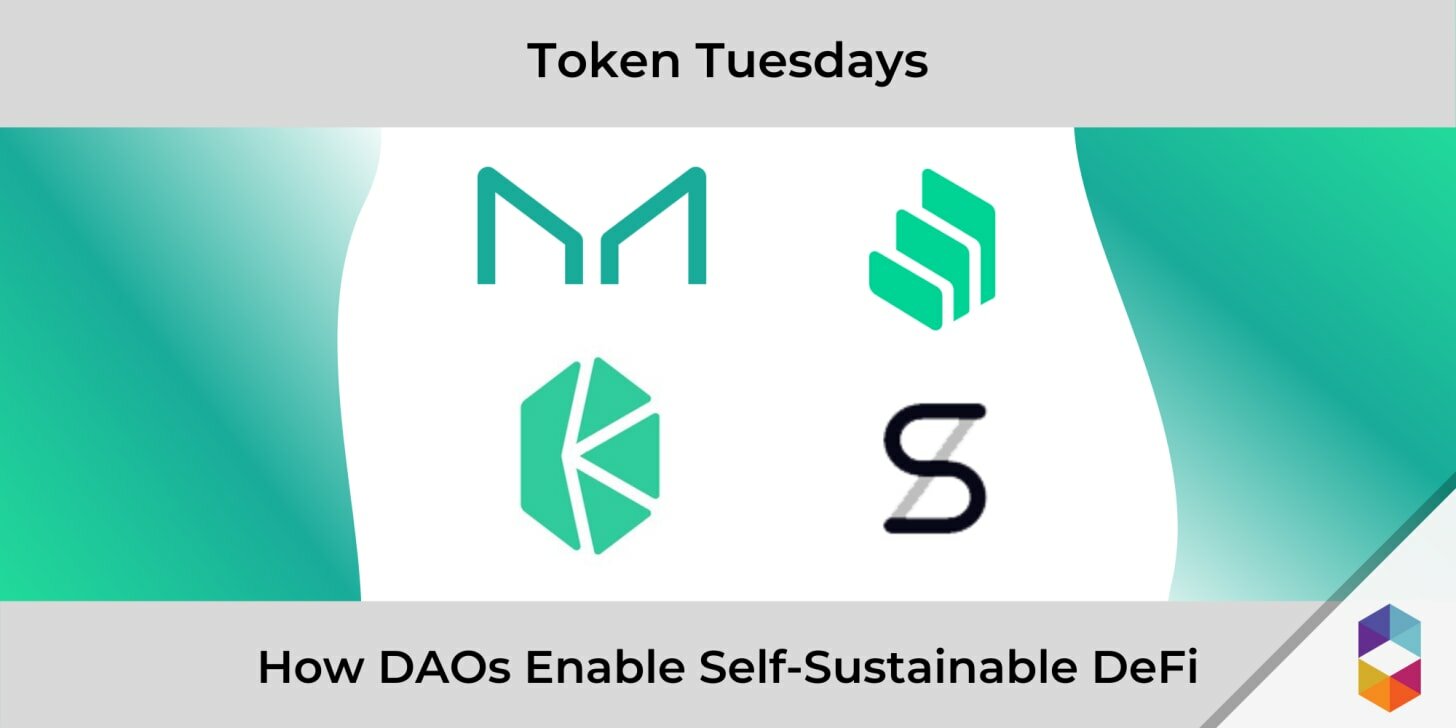As DeFi continues down its path towards global adoption, there’s one thing preventing today’s DeFi landscape from becoming truly decentralized, permissionless financial applications.
The “decentralized” part.
Many of our favorite DeFi applications today aren’t truly decentralized. It’s common for many DeFi teams to have admin keys and other administrative controls over the protocol or application – creating a degree of centralization and trust embedded with usage.
As such, many DeFi projects are turning their focus towards decentralization in an effort to realize the core value proposition of DeFi: unstoppable finance.
This is no easy task. Many projects over the years have struggled to successfully transition into a fully decentralized, unstoppable networks/protocols/applications. Fortunately, Ethereum supports the infrastructure for a promising mechanism to aid in the decentralization process – DAOs.
The rise of DAOs has not gone unnoticed as we’re now beginning to see a common theme emerge within DeFi.
Many projects are incorporating DAOs.
KyberDAO
Earlier this year, Kyber announced a new suite of tokenomic upgrades called Katalyst.
Perhaps the biggest announcement within this was the creation of KyberDAO – a new way for the community to dictate how fees collected from Kyber’s decentralized exchange are distributed.
In short, KNC token holders will decide on how fees are split between:
- Voting Rewards – Distributed to holders who stake and participate in the KyberDAO governance.
- Token Burns – Allocated to burning outstanding KNC.
- Reserve Incentives – Rewards to those providing Kyber with underlying liquidity.
Best of all, participants in these decisions will earn users ETH – with those who stake the most KNC and are the most active in polls earning the largest share of the reward pool.
For those who aren’t very savvy on the interworking of Kyber, the system will allow for delegation in form of pool masters – essentially allowing anyone to transfer their voting power to someone with more knowledge and experience.
Compound
As the largest lending protocol in DeFi, many can agree that Compound is a crucial piece of infrastructure for the larger ecosystem. Up until now, Compound has not used a native token. Assets deposited to the platform earn interest on a Compound-specific token wrapper called cTokens. When users deposit Dai, they receive cDAI which collects interest as long as it’s being held.
This design has worked extremely well and has now allowed Compound to consider new options to better engage their community. With this, the project recently announced the creation of governance tokens – COMP – which are used to:
- Delegate voting rights
- Make new proposals
- Track historical voting weight
What’s important to keep in mind here is that in order for new proposals to be created, addresses must hold AT LEAST 1% of the COMP supply. Beyond this spem-prevention mechanism, this will also incentivize delegation as small tokenholders will send their voting power to a trusted provider in return for the ability to govern how protocol fees are distributed to different stakeholders.
SynthetixDAO
In February 2020, Synthetix launched GrantsDAO – one of the first of many milestones for the synthetic assets protocol to transition towards a complete decentralization. GrantsDAO is responsible for approving and denying grants for any tangible contributions to the Synthetix ecosystem, ranging from new products leveraging the protocol or even marketing efforts.
While GrantsDAO is a great first step, the impending decentralization process will also include the introduction of the full SynthetixDAO.
SynthetixDAO will have two primary controls:
- Treasury
- Governance
While the specific details surrounding both of these controls are still to be determined, it is encouraging to see the leading derivatives protocol embedding decentralization as one of its core focuses for 2020.
We’ll be keen on exploring how Synthetix continues to progress towards a fully decentralized, unstoppable protocol for synthetic assets.
MakerDAO
It goes without saying that the past few weeks for MakerDAO have been eventful. Black Thursday tested the protocol’s resiliency as the price of Ether nearly halved. While the extreme volatility resulted in some hiccups for the protocol and highlighted some outstanding issues, the Maker system performed fairly well.
Following the events, the Maker Foundation announced its upcoming transition to become a fully self-sustaining MakerDAO.
In short, the key features necessary for a successful transition include:
- Elected Paid Contributors:EPCs are hired by the DAO and should be considered the protocol’s workforce. EPCs will be paid directly through governance, requiring them to operate with high transparency standards.
- Maker Improvement Proposals (MIPs): The main tool for paving the way to self-sustainability. MIPs act as the primary mechanism for improving Maker Governance and the Protocol.
- Vote Delegates:The addition of a delegation mechanism will allow for more active participation in governance and a stronger signal of community direction – something absolutely vital to the success of the system as the community takes a greater role.
Key Takeaway
DAOs are acting as a pillar for fully decentralized, self-sustaining DeFi protocols.
The ability to leverage tokenized governance to efficiently allocate capital towards a range of initiatives via social consensus is a powerful concept beginning to be realized by the broader DeFi industry.
Further, these incentives are far more focused and tested than the existing “governance” schemas we’ve seen propped up to date.
Earnings will scale from reputation – instead of capital
We largely expect a new suite of service providers akin to the “staking as a service” companies popping up by providing “governance as a service”.
With delegation and opportunities for users big and small to capture in governance upside, we can envision a full-fledged economy in which the community reaps the benefits of DeFi’s continual growth.
Our spidey-senses are telling us that the aforementioned projects are only the tip of the iceberg for this developing trend.
If you or your company are curious to learn more about how to spin up your own DAO to delegate protocol governance, please get in touch.
We’re excited to play our role in helping to shape the governance structures of tomorrow!
Subscribe for More Content

Ready to get started?
Get in touch, or send us an email
About Us
Fitzner Blockchain Consulting is a leading management consulting firm that specializes in blockchain-based systems and their design

